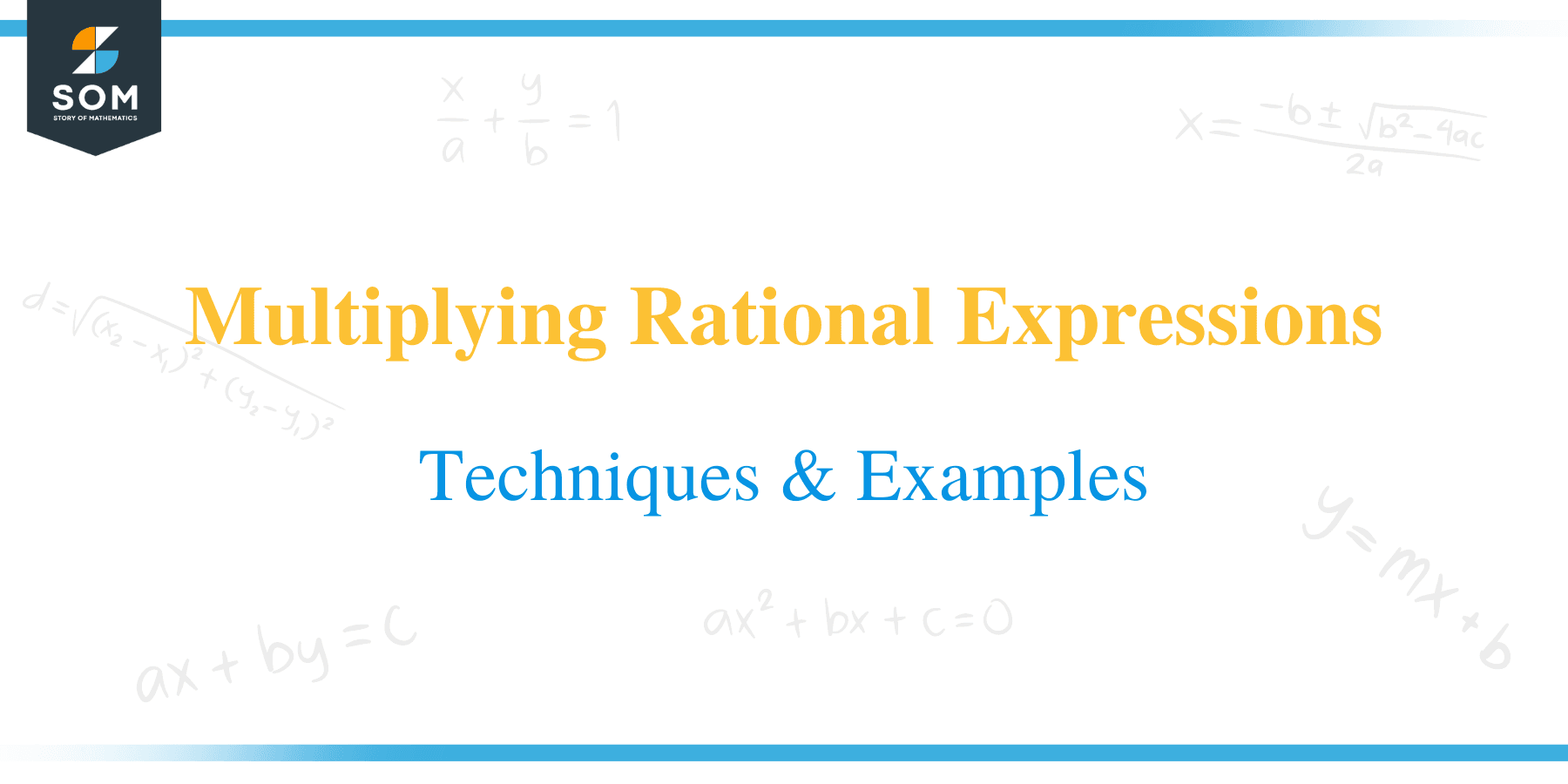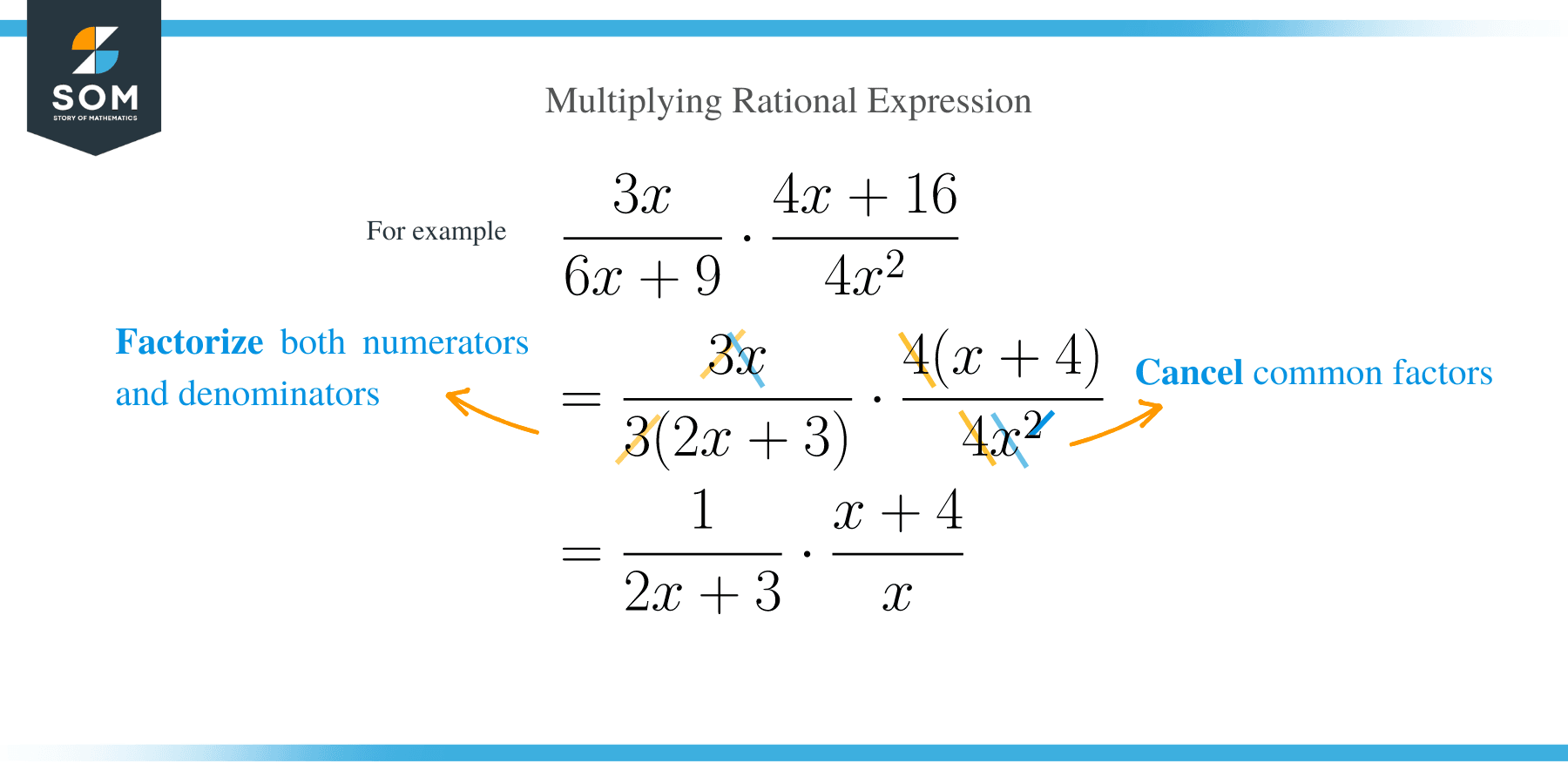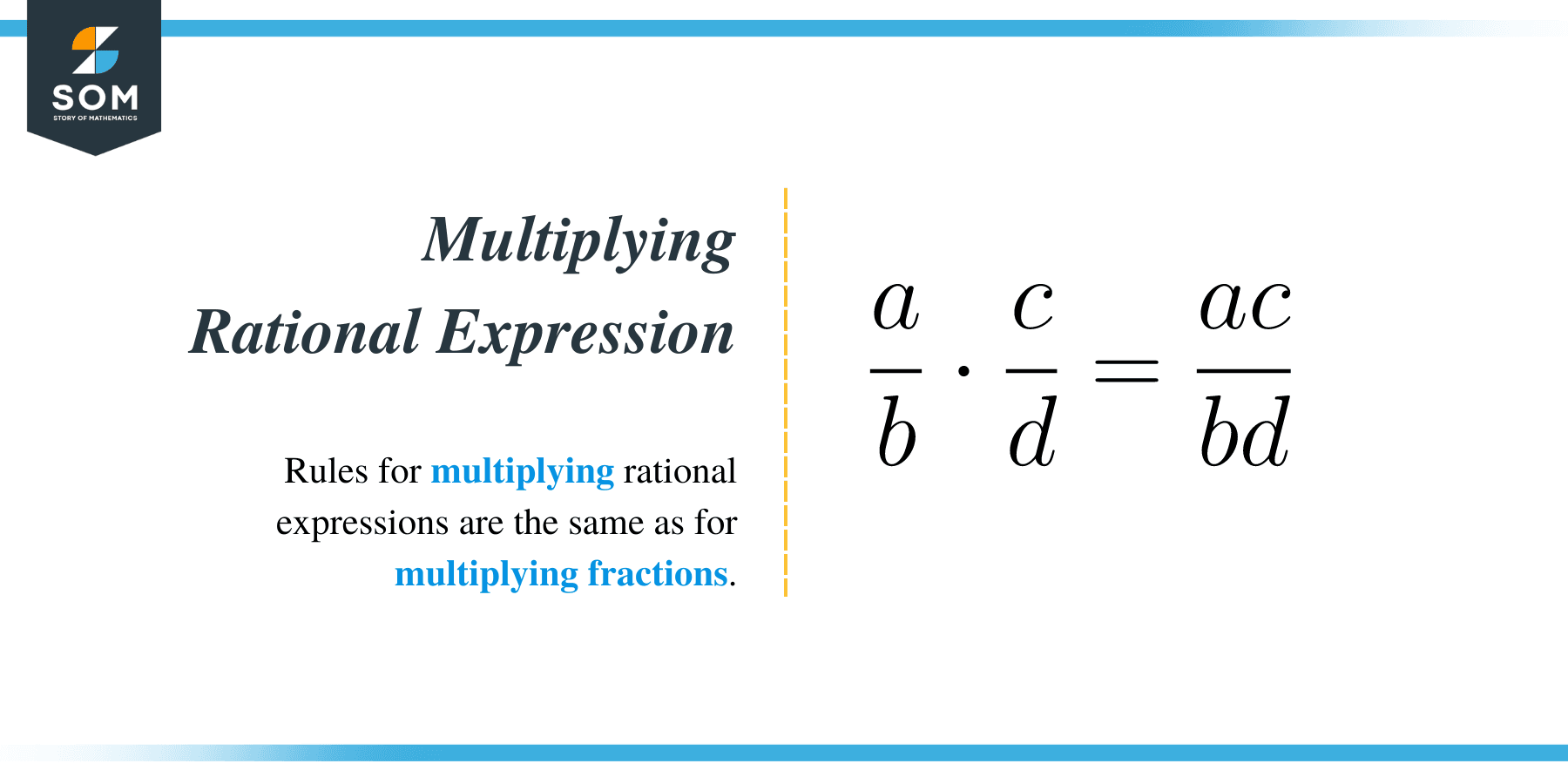- Home
- >
- Multiplying Rational Expressions – Techniques & Examples
Multiplying Rational Expressions – Techniques & Examples
 To learn how to multiply rational expressions, let’s first recall the multiplication of numerical fractions.
To learn how to multiply rational expressions, let’s first recall the multiplication of numerical fractions.
Multiplication of fractions involves separately finding the product of numerators and the product of denominators of given fractions.
For instance, if a/b and c/d are any two fractions, then;
a/b × c/d = a × c/b × d. Let’s take a look at the examples below:
- Multiply 2/7 by 3/5
Solution
2/7 × 3/5
= 2 × 3/7 × 5= 6/35
- Multiply 5/9 by (-3/4)
Solution
5/9 × (-3/4)
= 5 × -3/9 × 4
= -15/36
= -5/12
Similarly, rational expressions are multiplied by following the same rule.
How to Multiply Rational Expressions?
To multiply rational expressions, we apply the steps below:
- Completely factor out denominators and numerators of both fractions.
- Cancel out common terms in the numerator and denominator.
- Now rewrite the remaining terms both in the numerator and denominator.

Use the algebraic identities below to help you in factoring the polynomials:
- (a² – b²) = (a + b) (a – b)
- (x² – 4²) = (x + 4) (x – 4)
- (x² – 2²) = (x + 2) (x – 2)
- (a³ + b³) = (a + b) (a² – a b + b²)

Example 1
Simplify (x² – 2x) / (x + 2) * (3 x + 6)/ (x – 2)
Solution
Factor the numerators,
(x² – 2x) / (x + 2) * (3 x + 6)/ (x – 2)
⟹ x (x – 2) / (x + 2) * 3(x + 2)/ (x – 2)
Cancel out common terms in numerators and denominators of both fractions to get;
⟹ 3x
Example 2
Solve [(x2 – 3x – 4)/ (x2 – x -2)] * [(x2 – 4)/ (x2 -+ x -20)]
Solution
First, factor the numerators and denominators of both fractions.
[(x – 4) (x + 1)/ (x + 1) (x – 2)] * [(x + 2) (x – 2)/ (x – 4) (x + 5)]
Cancel out common terms and rewrite the remaining terms
= x + 2/x + 5
Example 3
Multiply [(12x – 4x2)/ (x2 + x – 12)] * [(x2 + 2x – 8)/x3 – 4x)]
Solution
Factor the rational expressions.
⟹ [-4x (x – 3)/ (x – 3) (x + 4)] * [(x – 2) (x + 4)/x (x + 2) (x – 2)]
Reduce the fractions by cancelling common terms in the numerators and denominators to get;
= -4/x + 2
Example 4
Multiply [(2x2 + x – 6)/ (3x2 – 8x – 3)] * [(x2 – 7x + 12)/ (2x2 – 7x – 4)]
Solution
Factor the fractions
⟹ [(2x – 3) (x + 2)/ (3x + 1) (x – 3)] * [(x – 30(x – 4)/ (2x + 1) (x – 4)]
Cancel out common terms in the numerators and denominators and rewrite the remaining terms.
⟹ [(2x – 3) (x + 2)/ (3x + 1) (2x + 1)]
Example 5
Simplify [(x² – 81)/ (x² – 4)] * [(x² + 6 x + 8)/ (x² – 5 x – 36)]
Solution
Factor the numerators and denominators of each fraction.
⟹ [(x + 9) (x – 9)/ (x + 2) (x – 2)] * [(x + 2) (x + 4)/ (x – 9) (x + 4)]
On cancelling common terms, we get;
= (x + 9)/ (x – 2).
Example 6
Simplify [(x² – 3 x – 10)/ (x² – x – 20)] * [(x² – 2 x + 4)/ (x³ + 8)]
Solution
Factor out (x³ + 8) using the algebraic identity (a³ + b³) = (a + b) (a² – a b + b²).
⟹ (x³ + 8) = (x + 2) (x² – 2 x + 4).
⟹ (x² – 3 x – 10) = (x – 5) (x + 2)
⟹ (x² – x – 20) = (x – 5) (x + 4)
[(x² – 3 x – 10)/ (x² – x – 20)] * [(x² – 2 x + 4)/ (x³ + 8)] = [(x – 5) (x + 2)/ (x – 5) (x + 4)] * [(x² – 2 x + 4)/ (x + 2) (x² – 2 x + 4)]
Now, cancel out common terms to get;
= 1/ (x + 4).
Example 7
Simplify [(x + 7)/ (x² + 14 x + 49)] * [(x² + 8x + 7)/ (x + 1)]
Solution
Factor the fractions.
⟹ (x² + 14 x + 49) = (x + 7) (x + 7)
⟹ (x² + 8x + 7) = (x + 1) (x + 7)
= [(x + 7)/ (x + 7) (x + 7)] * [(x + 1) (x + 7)/ (x + 1)]
On cancelling common terms, we get the answer as;
= 1
Example 8
Multiply [(x² – 16)/ (x – 2)] * [(x² – 4)/ (x³ + 64)]
Solution
Use the algebraic identity (a² – b²) = (a + b) (a – b) to factor (x² – 16) and (x² – 4).
(x² – 4²) ⟹ (x + 4) (x – 4)
(x² – 2²) ⟹ (x + 2) (x – 2).
Also apply the identity (a³ + b³) = (a + b) (a² – a b + b²) to factor (x³ + 64).
(x³ + 64) ⟹ (x² – 4x + 16)
= [(x + 4) (x – 4)/)/ (x – 2)] * [(x + 2) (x – 2)/ (x² – 4x + 16)]
Cancel common terms to get;
= (x – 4) (x + 2)/ (x² – 4x + 16)
Example 9
Simplify [(x² – 9 y²)/ (3 x – 3y)] * [(x² – y²)/ (x² + 4 x y + 3 y²)]
Solution
Apply the algebraic identity (a²-b²) = (a + b) (a – b) to factor (x²- (3y) ² and (x² – y²)
⟹ (x²-(3y) ² = (x + 3y) (x-3y)
⟹ (x² – y²) = (x + y) (x – y).
Factor (x² + 4 x y + 3 y²)
= x² + 4 x y + 3 y²
= x² + x y + 3 x y + 3 y²
= x (x + y) + 3y (x + y)
= (x + y) (x + 3y)
Cancel common terms to get:
= (x – 3y)/3

